Business plans are the backbone of any successful venture. They are supposed to set the course for our business’s future and guide us in achieving our goals.
However, what happens when the same business plan, despite all the effort you put into it, doesn’t deliver the results you expected?
It can happen, even with the best-laid plans due to a gazillion internal and external factors.
While we can’t control them all, we sure can learn from the mistakes of others to avoid falling into the common traps.
This blog post on 10 reasons a business plan fails offers insights and advice from real-life entrepreneurs who have experienced this failure themselves.
So let’s get into it.
Top 10 reasons why business plans fail (and how to avoid them)
From insufficient market research to flawed operations—let’s uncover some of the most common reasons for business plan failure.
1. Not pivoting quickly enough
Sometimes, the very reason for a business plan failure is its inability to pivot at the right time. You see, it’s really hard to tell what will work before you put your product or service out for people’s consumption.
That said, even the most seemingly perfect business idea can fail after the launch. And this may happen despite all the validation, market research, strategizing, and financial planning.
However, this doesn’t mean you wrap up and call the quits after your business shows the first sign of failure. All it means is you acknowledge the failure, get market feedback, and pivot your plan.
Yes PIVOT. Don’t get too attached to the business idea that you become blind to the other elements necessary to create a commercially viable business.
Most successful businesses today are the results of a pivot. In a Tim Ferriss podcast, the former Instagram founder, Kevin Systrom, encourages entrepreneurs to fail and reiterate their plans until they find a business product that can survive.
While the entire podcast is packed with insight, here’s something to think through.
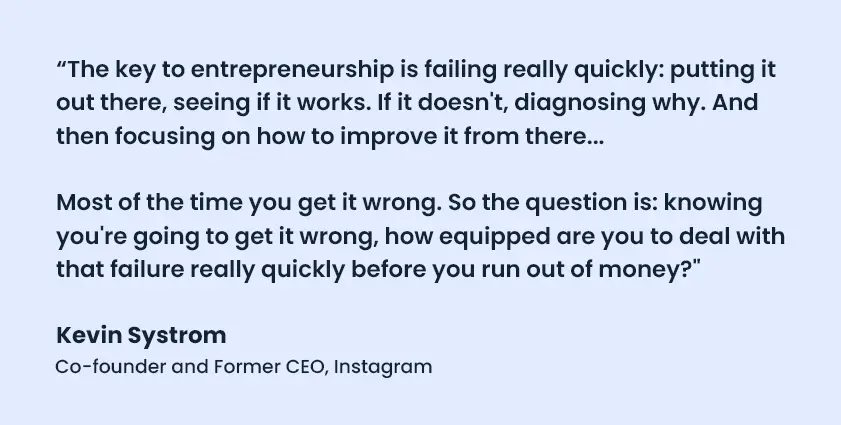
2. Not being put to use

Even your most relevant business plans will fail if you don’t put them to use.
It doesn’t matter whether your plan is a 40-page fully detailed document or a 10-page document offering a roadmap. All that matters is you use your business plan to make decisions and track the progress.
When you use your business plan, you don’t lose track of your ultimate vision. You remain dedicated to your goals and successfully navigate through difficult situations.
Far too often, business owners create a plan and then shelve it. They forget that it’s a living document, supposed to undergo regular reviews and updates. Ideally, a quarterly or an annual update to maintain its relevance.
In short, one of the easiest ways to avoid business plan failure is by putting the plan to use.
3. Rigidity and inflexibility
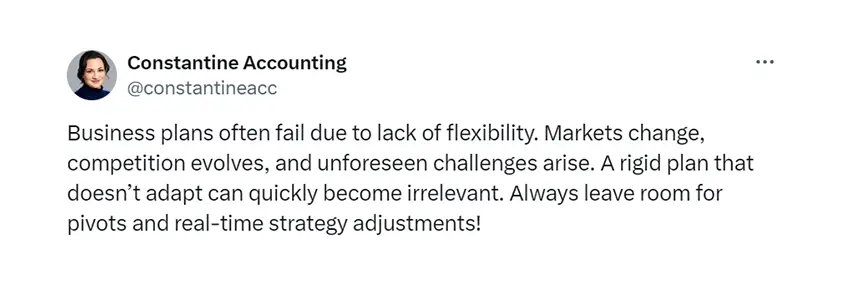
As harmful as it is, to not follow a business plan, following it too rigidly is also a problem.
As Tommy Mellow says, it’s easy to get tunnel vision and stick to a plan just because it’s what you laid out. However, business plans aren’t set in stone.
Market shifts. Preferences change. Competition evolves. And before you know it, you might need changes that weren’t mapped in your business plan.
For instance, you might have mapped your marketing channels in a business plan. However, market feedback reveals that some of these channels are ineffective, while new, more promising ones have emerged.
In such cases, if you ignore the market feedback and stick rigidly to your original plan, you risk missing out on a valuable opportunity to capture a larger market share. Besides, if you continue to invest in outdated strategies, you may incur unnecessary costs.
To avoid getting stuck in a situation where the plan fails you, keep room for strategic adjustments. Regularly review the progress of your goals, keep an eye on financial fluctuations, and immediately recognize the strategies not working for you.
Don’t build your plan on extreme certainty. Allow it to evolve with the changing market situations and embrace the new challenges and opportunities as they arise.
Remember, a business plan is only as good as your ability to adapt when it crumbles.
4. Too much planning
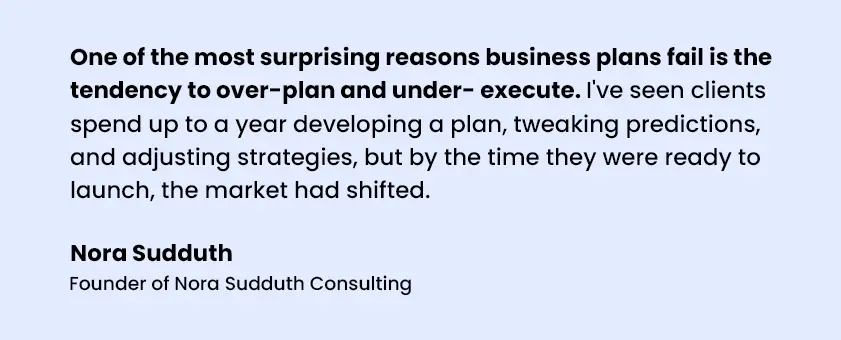
Nora Sudduth, founder of Nora Sudduth Consulting
Over-planning kills the business idea.
It’s impossible to know with 100% certainty that a business idea would turn successful.
Instead of spending months and years perfecting a business plan, get in the market. Test your ideas, gather market feedback, reiterate your offerings, and adapt your plan.
It’s actually as simple as that (maybe not). However, the longer you spend planning, the further you’re distancing yourself from market reality.

As this tweet by AstroBae asserts, focus on a few key areas and pursue them intensely.
If your business model is sustainable, you will eventually find the right mix of marketing channels, operations, and sales. As for the product, it’ll evolve with the customer’s needs and the shifts in the competitive landscape.
5. Incomplete business plans
One of the biggest business plan mistakes is having the strategic and fundamental aspects of your plan unclear.
Regardless of short or long, every business plan should answer a few fundamental questions, such as:
- What is the vision of your business?
- What are the business milestones and its short-term objectives?
- What is the size of your target market?
- What is your competitive advantage in the market?
- What would be the cash-flow situation in the business?
- How will the business operations be handled?
- What’s the problem you’re trying to solve?
Analyze and check if your business plan answers these questions. If not, address the gaps with proper planning and get your business a reliable roadmap to follow.
Create winning business plans with our
AI Business Plan Generator
Plans starting from $14/month

6. Poor execution

Execution is the most important part of planning. If your execution is flawed, even the most successful business strategies will fail.
Now, you may have high-level objectives for your business. However, it’s important to break them down into concrete, manageable tasks. Without that, you would just be navigating your way in the dark.
We interviewed a couple of entrepreneurs to understand how lack of execution leads to business plan failure. Well, the insights surely offered some refreshing views.

Brooke Webber, Marketing Head at Ninja Patches
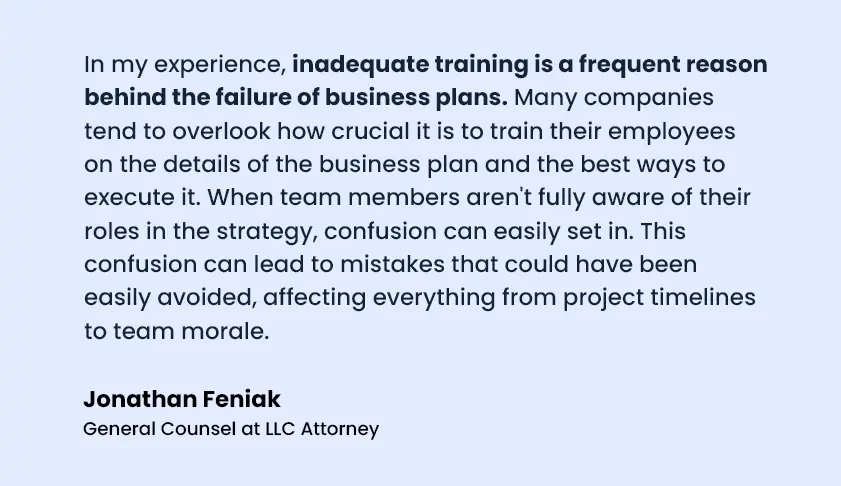
Jonathan Feniak, General Counsel at LLC Attorney
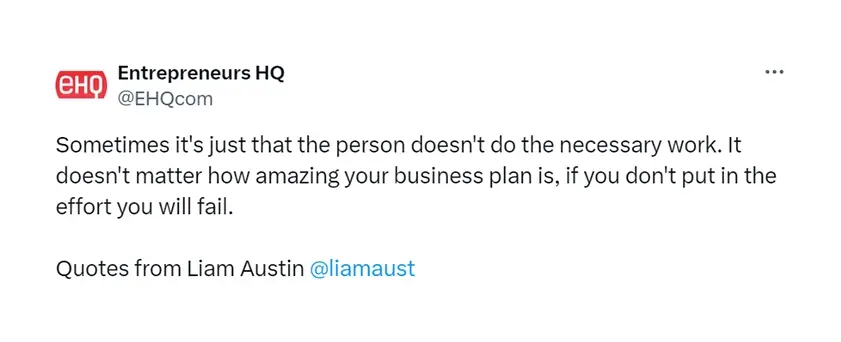
Liamaust, Founder at Entrepreneurs HQ
So how do you fix this?
Well, here are a few ways to improve your business plan execution:
- Outline clear actionable steps to achieve goals
- Clearly communicate the roles and responsibilities
- Ensure efficient and sufficient resource allocation
- Set clear performance measurement systems
- Practice effective leadership
7. Limited market research
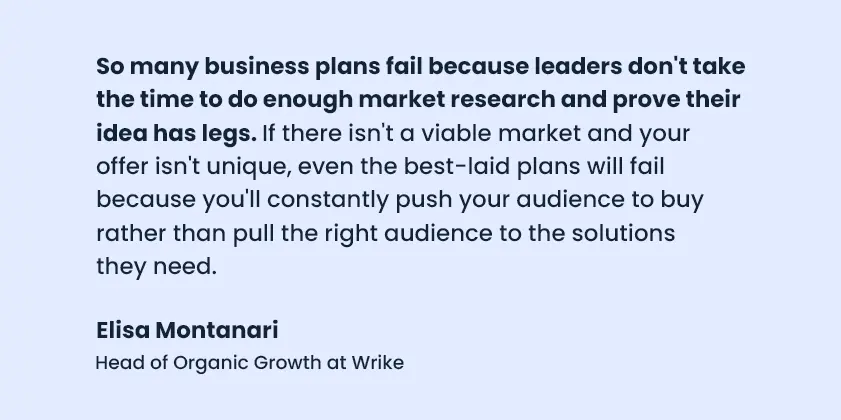
Elisa Montanari, Head of Organic Growth at Wrike
Business plans often fail when they are built on insufficient market research data.
To make informed business decisions, entrepreneurs need a deep understanding of their market, target audience, and competition. However, most entrepreneurs either spend too little time gathering data or rely on outdated, superficial information to make important business decisions.
This lack of thorough research results in:
- Inflated demand projections
- Misidentifying your wrong audience
- Product-market mismatch
- Misjudged competitive edge
- Misinterpreting customer preferences
- Missing market trends
- Setting a wrong pricing strategy
A business plan built on shaky market assumptions may seem perfect on paper. However, in reality, it’s nothing more than a display of your assumptions.
These assumptions result in costly mistakes, not only monetarily, but in terms of time and reputation as well.
To avoid creating a business plan offering a false market overview, gather trustworthy data through primary and secondary sources. Focus on interpreting the data correctly and avoid favorable biases in your analysis.
Most importantly, talk to your potential customers. Understand their pressing problems, establish the importance of your solution to them, and make necessary shifts to your offerings.
8. Inadequate financial planning
Another reason for business plan failure is insufficient and unrealistic financials.
Entrepreneurs tend to create projections that are more aspirational than practical. There’s either an overestimation of revenue or an underestimation of costs.
Adding to it, most businesses have zero understanding of the funding essential to kickstart their business. They often underestimate their investment requirements and fail to account for additional funding rounds in their business plan. This often leads to a cash crunch, sooner or later, drawing the business plan towards failure.
To ensure that your business plan builds on realistic financials, keep a very balanced perspective.
Include all sorts of expenses, even the miscellaneous ones, in your expense forecasts. As for your revenue estimates, adopt a conservative approach. Further, create a cash flow forecast that accounts for slower-than-expected sales and unexpected expenses.
This will help you create projections grounded in reality rather than wishful thinking.
That said, financial planning isn’t sufficient. Managing finances is equally important and every entrepreneur must learn this art.
As Pedro Orlando, the visionary behind Evrythink suggests in his Twitter thread:
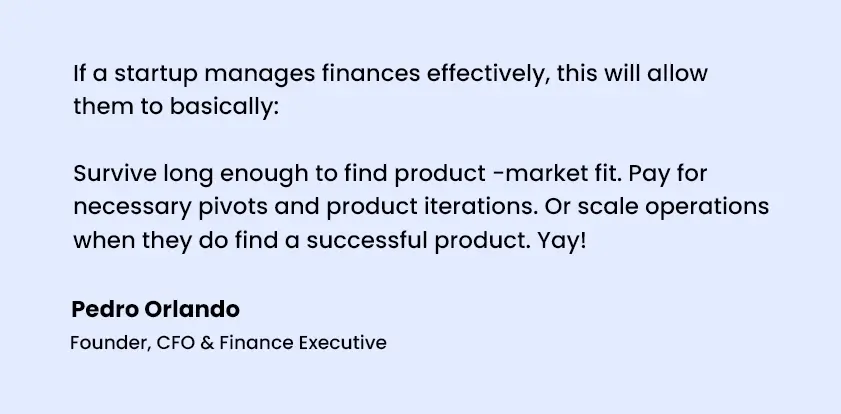
9. Lack of collaborative input
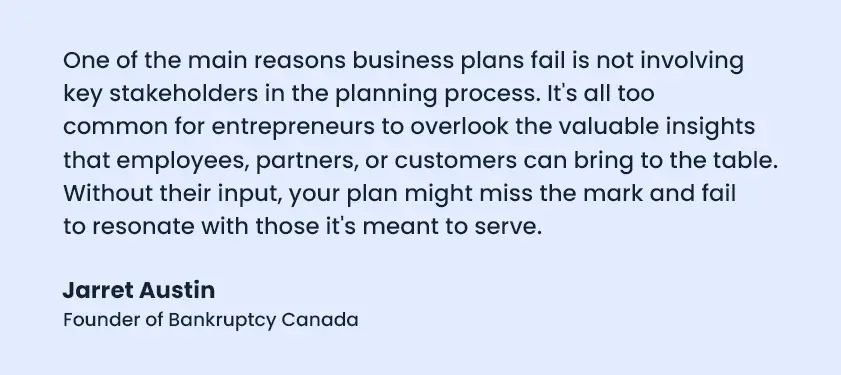
Jarret Austin, Founder of Bankruptcy Canada
If you don’t involve the key stakeholders in the planning process, the resulting plan is likely to be disoriented from reality. After all, planning is a collaborative process. There’s no possible way for you to have all the answers on your own.
By involving the stakeholders, managers, leaders, and key employees in your planning process, you get inputs and insights that are impossible to know on your own.
For instance, involving your customer support team in the planning process can help gain insights into common customer pain points that might not be apparent to you. Through this insight, you can adjust your product features, service offerings, or customer communication strategies to better address these concerns.
Just by involving the right people in the planning process, you shift from the space of limited knowledge to reality. This will help you create a business plan that aligns with what customers truly want and need.
10. Highly generalized plan
Sometimes, a business plan fails merely because it’s not customized for its audience.
A generic, one-size-fits-all business plan might miss the mark when presented to different stakeholders. Be it an investor, a potential partner, or an internal team—every audience has its own interests and priorities when reading a business plan. Failing to tailor the plan results in a lost audience.
For instance, a business plan prepared for investors might focus more on financial projections, market analysis, and ROI. However, a business plan prepared for potential partners might detail everything from product technicalities to a hiring plan. If you approach investors with a 40-page plan, they might not pay you any heed.
To avoid such situations, research your audience (i.e. investors). Understand what they prioritize in a business plan and focus on presenting that information more effectively.
However, despite all the customizations, sometimes a business plan might just not align with what the investor is looking for.
For instance, Paul Graham, a renowned investor revealed never having read a business plan. As per his Twitter thread:

Now, if he were the investor you were approaching, you simply wouldn’t need a business plan to begin with.
That said, the absence of a business plan shouldn’t be mistaken for an absence of business planning. It’s quintessential regardless of whether you require a plan or not.
How Upmetrics can help to improve your business plan
The reason you’re here is because your business plan is failing you. Despite your best efforts, it isn’t delivering the results you expected.
Well, don’t give up on the business plans just yet. They are the roadmap to your success and you know it. Instead of shelving them, let’s focus on refining your existing plan with the Upmetrics.
With the Upmetrics business planning app, you get a guided workflow to strengthen your overall business planning. Its modern business plan templates and AI assistance allow you to focus on important business plan aspects such as market research, financial planning, strategic planning, and operations.
With Upmetrics you can prepare a fully relevant and successful business plan without feeling lost.


